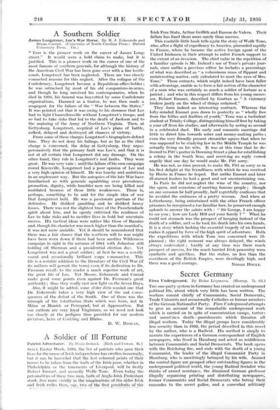A Soldier of Ill Fortune
Patriot Adventurer. By Denis Ireland. (Rich and Cowan. 6s.) SINCE Easter Week, 1916, the list of patriots who gave their lives for the cause of Irish independence has swollen immensely, but it can be hazarded that the last coloured prints of their heroes to be taken from the walls of the Irish Poor, whether in Philadelphia or the tenements of Liverpool, will be firstly Robert Emmet, and secondly Wolfe Tone. Even today the personalities of these two men, both of Anglo-Irish Protestant stock, live more vividly in the imaginations of the older Irish and Irish 'exiles than, ay, -'two of the` first presidents of the
_ — Irish Free State, Arthur Griffith and Eamon de Valera. .Their failnre has fixed them more surely than success.
This readable little book tells again the story of Wolfe Tone, who, after a flight of expediency to America, proceeded rapidly to France, where he became the active foreign agent of the United Irishmen in their attempt to enlist French support to the extent of an invasion. The chief value in the repetition of a familiar episode is Mr. Ireland's use of Tone's private jour- nals, since unlike a Previous editor he includes a percentage of what was described as " a voluminous mass of flippant and uninteresting matter, only calculated to meet the eyes of Mrs. Tone." These extracts, which might indeed have been fuller with advantage, enable us to form a fair notion of the character of a man who was certainly as much a soldier of fortune as a Patriot ; and who in this respect differs from his young succes- sor, Robert Emmet, described by Grattan as " A visionary broken justly on the wheel of things ordained." '
They form indeed an interesting contrast. Whereas the lofty-minded Emmet goes down to posterity as " wholly free from the follies and frailties of youth," Tone was a turbulent student at Trinity College, distinguishing himself first by taking a year off from his studies, and afterwards by acting as second in a celebrated duel. His early and romantic marriage did little to direct him towards sober and money-making paths ; even the very friendly present chronicler agrees that when he was supposed to be studying law in the Middle Temple he was actually living on his wits. It was at this time that he der livered to Pitt's porter in Downing Street a plan for establishing a colony in the South Seas, and receiving no reply vowed angrily that one day he would make Mr. Pitt sorry.
He was not, as time proved, to make Mr. Pitt as sorry as in his first delight at the friendliness with which he was received by Hoche in France he hoped. But unlike Emmet and later ill-starred leaders he had a good and not unentertaining run.
In Paris he did not neglect the wine of the country, nor the opera, and occasions of meeting famous people ; though on one occasion he half proudly, half regretfully confesses that he avoided the embraces of a pretty woman. And when at Letterkenny, being entertained with the other French officer prisoners he recognised a too familiar face, he preserved enough aplomb to answer the salute with : " Sir George, I am happy to see you ; how are Lady Hill and your family ? " What he could not stomach was the prospect of hanging instead of the death of a soldier, and so he took his death into his own hands. It is a story which lacking the essential tragedy of an Emmet makes it appeal by force of the high spirit of adventure. Both the expeditions with which Tone was concerned were ill- planned ; the right moment was always delayed, the winds always malevolent ; hardly at any time was there much prospect of success, for the much harried Irish peasantry were apathetic and spiritless. But the stakes, no less than the overthrow of the British Empire, were dazzlingly high, and






































 Previous page
Previous page